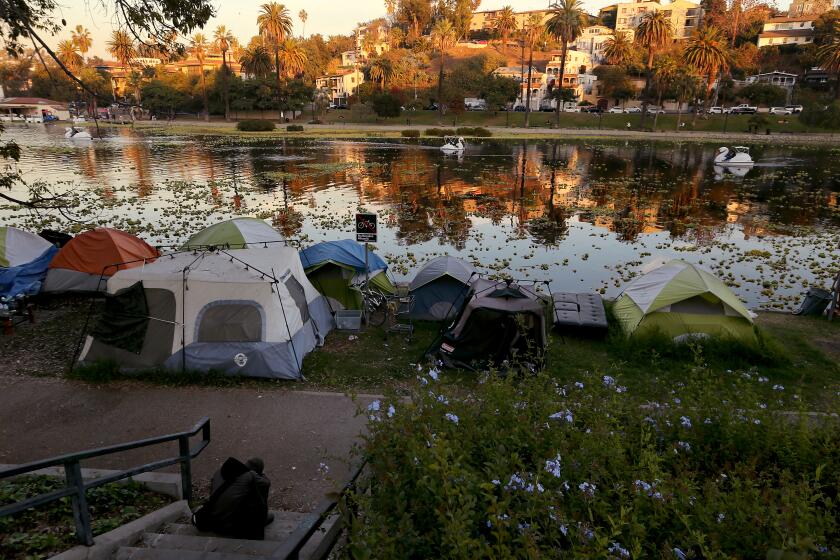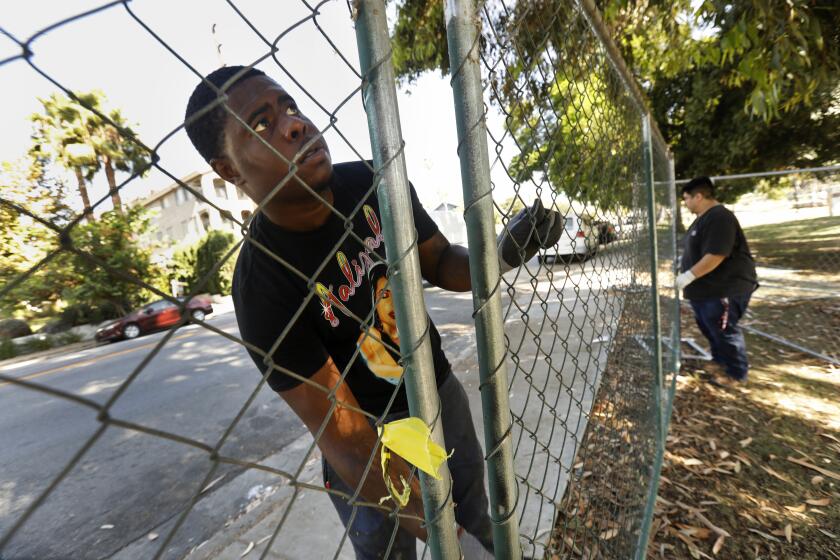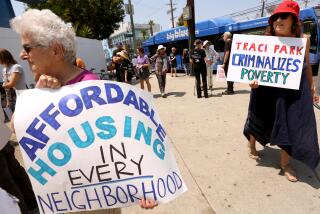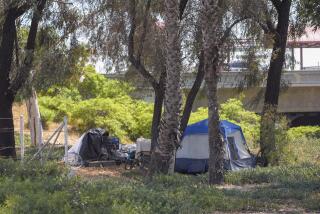Opinion: Why my pyromaniac neighbor lives outside the law
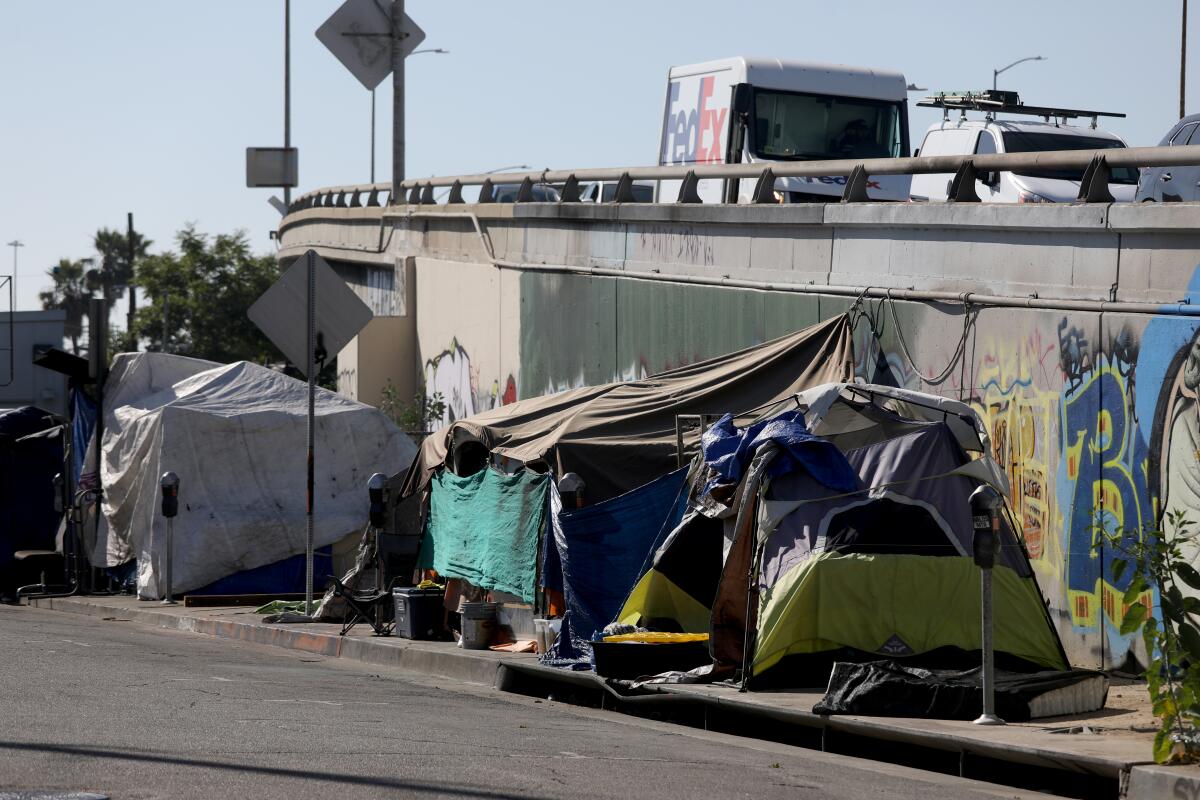
The first fire started last August, in the tent of a man living at the base of the public stairwell beside my house near Echo Park. It consumed much of the surrounding hill and came within a few feet of my yard before the fire department arrived. Another individual moved in soon after, and the second fire began in a shopping cart where he stored some possessions.
I don’t know what caused the third and fourth fires, but I found J., an unhoused resident of the neighborhood, starting the fifth a few months back, while on my 3:30 a.m. commute to the bakery where I work. It seemed to offer him an illicit thrill, and he apologized shamefacedly while we put it out. I tried to explain that starting fires was dangerous and that he needed to stop.
For the record:
3:19 p.m. July 10, 2023An earlier version of this article incorrectly stated that L.A. County Dist. Atty. George Gascón’s office prosecuted misdemeanors in the city of Los Angeles. Those are handled by the City Attorney’s office.
But J. started the sixth fire also, early last Saturday morning, and this one was big enough to catch some of the surrounding underbrush. I was not as calm this time, sprinting toward it barefoot in the dark and screaming, while J., terrified, stomped it out. Yet afterward I did not consider calling the police.
L.A.’s homeless services are hopelessly overburdened, and J. needs my help now.
Anyone who walks L.A.’s streets or takes our public transit understands that people experiencing homelessness effectively exist in a state of lawlessness. It feels as if authorities are unwilling to intervene except in cases of serious crimes committed against housed people or prosecute minor offenses such as disturbing the peace.
This is admirable in the abstract, and ideally the police would not be the city’s point of contact for our unhoused population. But increasingly this disregard seems to have filtered to the general citizenry as well, and it feels as if we have simply become accustomed to seeing people passed out in the street, or smoking meth on the sidewalk.
The belief that we are showing people experiencing homelessness compassion if we spare them the attention of law enforcement is understandable but is fundamentally misguided. Through volunteer work and by talking to people in my neighborhood, I have met many unhoused people. Most of them do not set things on fire. They do not walk naked through traffic, and whatever issues they have with substance abuse they keep mostly to themselves. In my experience, the majority of crimes committed against people experiencing homelessness are never reported because they are most often perpetrated by other unhoused people. Placing the unhoused outside the consequence of law also means placing them outside its protection.
Moreover, the city’s failure to enforce the law among the homeless population puts that burden on private citizens, with potentially awful results. Despite all my experience working with the unhoused, I was scared and furious the last time I saw J. It isn’t hard to imagine our interaction ending badly. We don’t ask Angelenos to put out fires unless they are trained professionals, nor should we have them serve as de facto homeless outreach workers. Doing so fuels the tensions between the housed and unhoused citizens of Los Angeles.
Opinion: Removing the Echo Park Lake fence is a gesture, but no real help for our unhoused neighbors
People like me may oppose the fence, but we can’t pretend that its removal will do anything to better the lives of people experiencing homelessness in L.A.
J. and those like him are being failed by our negligence. Apart from his issues with pyromania, J. is a nice enough person. He does not seem to associate the fires he starts as being harmful to others. There is nothing compassionate about allowing J. to indefinitely continue this obviously unhealthy behavior, and our unwillingness to help protect him from himself is not kindness but cruel indifference. Justice does not have to be punitive.
The ultimate goal of our homelessness policies needs to be finding permanent supportive housing for everyone living on the streets. As the depressing results of last month’s homeless count revealed, we are nowhere near that point. At present, we have some 50,000 more people experiencing homelessness than we do places to put them, and it will most likely take decades of development to make up that disparity.
In the interim, we cannot simply accept that people experiencing homelessness can or should be living outside the framework of law. No one should be persecuted because of their housing status, but neither can we refuse to address obviously harmful behavior. Gov. Gavin Newsom’s CARE courts are a good start, but changes in conservatorship law must be made for people like J. to get the care they need, even if they don’t think they need it.
In the meantime, I sleep with the windows open and wake to every sound. The dry season is coming, and I fear that the next fire will be more than my cheap garden hose can handle.
Daniel Polansky is a baker and writer living in Los Angeles.
More to Read
A cure for the common opinion
Get thought-provoking perspectives with our weekly newsletter.
You may occasionally receive promotional content from the Los Angeles Times.
